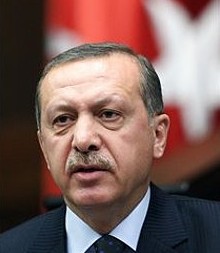 “Israel must pay the price of the blood it shed,” said Turkey’s Prime Minister Recep Tayyip Erdogan this week as he honored the lives of those who were “martyred” defending the Mavi Marmara.
“Israel must pay the price of the blood it shed,” said Turkey’s Prime Minister Recep Tayyip Erdogan this week as he honored the lives of those who were “martyred” defending the Mavi Marmara.
The clash between Turkey and Israel comes at a moment when the state which was once the seat of the Ottoman Empire is reclaiming some of its historic regional significance.
But this Turkish revival is not being welcomed by the United States. The New York Times says:
Turkey is seen increasingly in Washington as “running around the region doing things that are at cross-purposes to what the big powers in the region want,” said Steven A. Cook, a scholar with the Council on Foreign Relations. The question being asked, he said, is “How do we keep the Turks in their lane?”
From Turkey’s perspective, however, it is simply finding its footing in its own backyard, a troubled region that has been in turmoil for years, in part as a result of American policy making.
While many Israeli’s might currently be nurturing the belief that the Jewish nation just struck back against some kind of Turkish assault, hardly anyone one else harbors such delusions about who has been wronged. Erdogan emphatically asserts that Israel will pay a price.
This is a moment, Michael Vlahos suggests, in which a Turkish Renovatio is taking place.
“This is language that we have not heard since the time of Gamal Abdul Nasser.” Thus wrote the influential chief editor of Al-Quds al-Arabi newspaper, referring to Turkish Prime Minister Recep Tayyip Erdogan’s fiery response to the Israeli assault on the Gaza flotilla — adding that such “manly” positions and rhetoric had “disappeared from the dictionaries of our Arab leaders (since the demise of Egyptian President Gamal Abdul Nasser).” He lamented, “Arab regimes now represent the only friends left to Israel.” (From the CSM here.)
What is Renovatio? Simply, it is a national revival that takes the form of a restoration: Where things once right and true triumphantly return. Renovatio represents identity reborn.
[…]
A contemporary Turkey that is robustly part Western and also part Islamist in fact represents the most valuable model for the future Ummah — and especially for its Arab-Urdu core.Enough time has passed now that old Arab-Turkish scores should have receded, just as they have recently among Turks and Greeks. The Mavi Marmara incident — if followed up strongly and unrelentingly — can assert a neo-Ottoman claim to symbolic leadership of an emerging Muslim Renovatio.
Such a restoration would unfold in ritual terms. But is that not the point — the point that the US and Israel stubbornly refuse to see? The whole design of the fabled Khilafat was in reality always that of a Muslim Commonwealth, not of a unitary state (save for Al Qaeda fantasists). Renovatio means a restoration of collective identity and purpose. But it also requires a leader: A Champion who will right wrongs and bring Islam back to the glory of the “Rightly Guided.” Not as political order but as renewed collective consciousness.


This is an extremely interesting exchange. The guy in Washington certainly seems to be trying to drive a wedge between/among Syria, Turkey, and Iran — namely by suggesting that all Turkey wants is to dominate the two “pipsqueak” nations of Syria and Iran, whose economies are so “tiny” compared to Turkey’s. But this is, of course, the traditional way the US (and Israel) has dominated the Middle East up until recently, i.e., by dividing the region into “moderate” and “extremist” nations — “moderate” being a euphemism for those nations who have been bribed and bullied into toeing the Washington line, and “extremist” meaning those nations who don’t suck enough and who resist Israel as THE regional power. Very interesting.
The question being asked, he said, is “How do we keep the Turks in their lane?”
That question reminds me of Goethe’s poem “Der Zauberlehrling”: how do I stop the broom?
P.S. “Keeping the Turks in their lane” was tried once before, namely after WW1. A man named Kemal Ataturk handily defeated that attempt. Anyone in Washington who believes that the Turkish people have forgotten who Suleiman the Magnificent and Kemal Ataturk were and achieved is cuckoo.
Quote: The question being asked, he said, is “How do we keep the Turks in their lane?”
The assertion reported in the NYT is in itself a admission of aggressive policies. What right do these imperialists suppose they possess to even consider another sovereign nation to be nothing more than a chattel to be ordered about?
If anyone needs to be kept in a ‘lane’ it is surely the US and its carbuncle Israel. The assertive policies of the Turkish government are clearly a necessary adjunct to the creation of a more just and democratic world order. The Tehran Agreement between Turkey, Brazil, and Iran is surely another, and the hysterical response of Washington, that sees it attempting to deny a tension reducing measure — identical to one it itself had brokered mere months before — is nothing more than an barefaced attempt to increase turmoil and tensions in the Middle East. Washington’s power comes from promoting conflict.
I wonder if this news from a month ago explains the PKK Kurdish rebels’ attack on the Turkish naval base in Iskenderun (near the Syrian border) two hours before the Israeli attack on the flotilla, attacks which most Turks suspect were coordinated:
Turkish Air Defense System Deployed to “Defend Syria, Iran against Israel Raids”:
If the Israelis carry through with their recent threats to attack Lebanon again, they might not have air superiority this time.